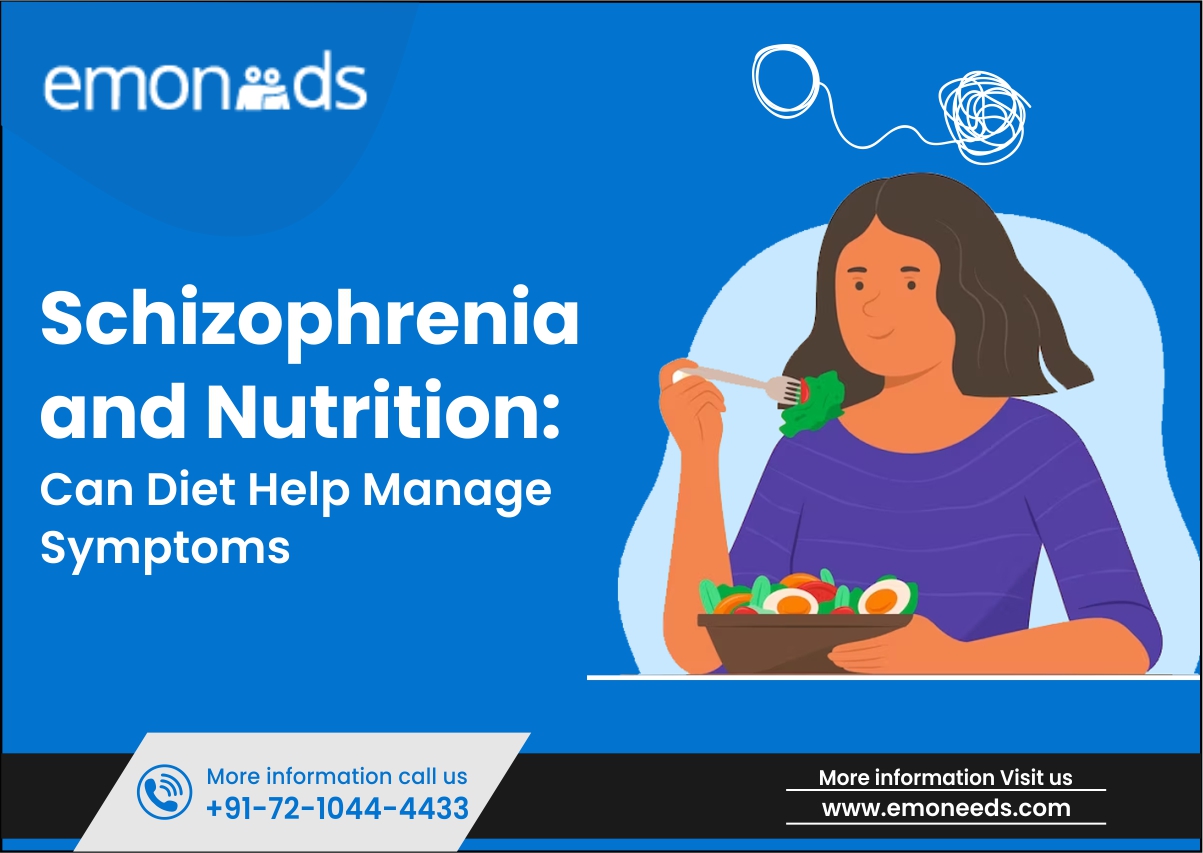
- June 8, 2023
- Saloni Kabra
- 0
Schizophrenia is a mental disorder. Symptoms include hallucinations, delusions, disorganized thinking, and difficulties in social interactions. While medications are essential for managing symptoms, it’s important to recognize that lifestyle factors, such as diet, can significantly impact overall well-being.
By exploring the potential relationship between diet and mental health, we hope to provide valuable insights and practical tips to support your journey toward managing schizophrenia symptoms. Remember, at Emoneeds, we are committed to providing you with the resources and support you need to live your life to the fullest.
Stay with us as we delve deeper into the connection between nutrition and schizophrenia. This blog will also explore the nutrients crucial for symptom management and offer practical suggestions for incorporating a schizophrenia-friendly diet into your daily life. Together, we can work towards maximizing your well-being and helping you achieve your true potential.
Table of Contents
ToggleThe Relationship Between Diet and Mental Health
What we eat can have a profound impact on how we feel and function. There is a strong link between nutrition and our mental well-being. This connection goes beyond just physical health; it also extends to our brain function and emotional well-being.
A healthy diet rich in whole foods, such as fruits, vegetables, whole grains, lean proteins, and healthy fats, can positively impact our mental health. These nutrient-dense foods provide essential vitamins, minerals, antioxidants, and omega-3 fatty acids that support brain function and promote emotional well-being.
For individuals living with schizophrenia, adopting a healthy diet can offer a ray of hope. While diet alone cannot replace medications or therapy, it can complement these treatments and potentially enhance their effectiveness.
Nutritional Considerations for Schizophrenia
When managing schizophrenia, paying attention to our nutritional intake can make a significant difference. Certain nutrients have shown promise in their potential to support brain function, alleviate symptoms, and enhance overall well-being for individuals with schizophrenia.
One nutrient that has garnered attention is omega-3 fatty acids. Fatty fish like salmon, mackerel, and sardines contain these healthy fats in abundance. Omega-3 fatty acids may help reduce inflammation in the brain, improve cognitive function, and even alleviate certain symptoms associated with schizophrenia.
B vitamins, such as folate, B6, and B12, are also important considerations. These vitamins play a crucial role in brain health and the production of neurotransmitters that affect mood and cognition. Foods like leafy greens, legumes, whole grains, and lean meats are excellent sources of B vitamins. Including these nutrient-packed foods in your diet can provide the necessary support for optimal brain function.
Antioxidants, known for their protective properties against oxidative stress, have also shown promise in mental health. Colorful fruits and vegetables, such as berries, spinach, and bell peppers, are rich in antioxidants. These vibrant foods can help combat inflammation and oxidative damage, potentially improving brain function and symptom management.
Additionally, it’s important to focus on a varied diet that includes essential minerals. Researchers have linked minerals such as zinc, magnesium, and selenium to mental health and brain function. You can incorporate nuts, seeds, whole grains, and lean meats into your meals as excellent sources of these minerals.
The Role of Gut Health
The emerging field of the gut-brain axis has shed light on the intricate connection between our digestive system and mental health. The gut houses trillions of bacteria, collectively known as the gut microbiome, which plays a vital role in various aspects of our health, including brain function and mood regulation. Studies have shown that individuals with schizophrenia may have an imbalance in their gut microbiome, known as dysbiosis.
Maintaining a healthy gut microbiome is crucial for overall well-being, especially relevant for individuals with schizophrenia. So, how can we support our gut health? The key lies in adopting a diverse and fiber-rich diet.
Including a variety of fruits, vegetables, whole grains, legumes, and fermented foods in your diet can promote a healthy gut microbiome. These fiber-rich foods are beneficial bacteria in our gut, allowing them to thrive and maintain a harmonious balance. Fermented foods like yogurt, kefir, sauerkraut, and kimchi contain probiotics, which are live bacteria that can contribute to a healthy gut environment.
Remember, taking care of your gut is not only beneficial for your mental health but also for your overall well-being. By nourishing your body with diverse foods and paying attention to your gut health, you can contribute to a healthier mind and body.
Practical Tips for a Schizophrenia-Friendly Diet
When treating schizophrenia, making mindful choices about your diet can be crucial in supporting your overall well-being. Here are some practical tips to help you maintain a schizophrenia-friendly diet:
Aim for balanced meals
Your meals should have a good mix of vitamins, minerals, and essential nutrients. Incorporate lean proteins like chicken, fish, or tofu with whole grains, colorful fruits and vegetables, and healthy fats like avocado or nuts.
Stick to regular eating patterns
Establishing consistent eating habits can help stabilize your energy levels and support optimal brain function. Try to have meals and snacks regularly throughout the day to maintain a steady supply of nutrients.
Practice portion control
Pay attention to portion sizes to ensure no overeating. Use smaller plates or bowls to help manage portion sizes visually. Listen to your body’s hunger and fullness cues, and eat until satisfied.
Minimize processed foods and sugar
Processed foods and sugary snacks can negatively impact overall well-being. Limit processed foods like fast food, packaged snacks, and sugary beverages. Instead, opt for whole, unprocessed foods as much as possible.
Stay hydrated
Hydration is essential for overall health, including mental well-being. Make sure to drink enough water throughout the day to stay hydrated. Consider incorporating herbal teas or infused water for added flavor and hydration.
At Emoneeds, we understand the importance of a schizophrenia-friendly diet in supporting your mental well-being. Our team of experts is here to provide comprehensive mental health care and assist you in making dietary choices that align with your goals.
Making small, sustainable changes to your diet can significantly affect your overall health and symptom management. Embrace the power of nutritious foods and let them nourish your body and mind.
Other Lifestyle Factors
Taking a holistic approach to managing schizophrenia goes beyond focusing solely on your diet. Incorporating other lifestyle factors into your daily routine is equally important. You can enhance your overall well-being by paying attention to exercise, sleep, and stress management. Here are some practical tips to consider:
Know the significance of exercise
Engage in activities you enjoy, like taking walks, dancing, or practicing yoga. Aim for at least 30 minutes of exercise most days of the week.
Prioritize quality sleep
Establish a consistent sleep schedule and create a calming bedtime routine. Limit electronic device usage before bed and create a comfortable sleep environment.
Manage stress effectively
Find healthy ways to cope with stress, such as practicing relaxation techniques, pursuing hobbies, or spending time in nature. Identify triggers and develop personalized strategies to manage stress.
Seek support
Build a supportive network of friends, family, or support groups who can offer understanding and encouragement.
It is important to note that it’s the combination of a well-rounded lifestyle that includes exercise, quality sleep, stress management, and support that can positively impact managing schizophrenia symptoms and nurturing your overall well-being.
Conclusion
Overall, adopting a healthy diet can offer numerous potential benefits in managing schizophrenia symptoms. By incorporating nutrient-rich foods, individuals with schizophrenia may support their overall well-being and potentially alleviate some symptoms. However, it’s important to remember that diet is just one piece of the puzzle. A comprehensive treatment plan for schizophrenia should include medication, therapy, and lifestyle modifications.
Emoneeds provides a supportive platform where you can access comprehensive mental health care, including expert psychiatrists and clinical psychologists who can guide you in integrating dietary changes into your treatment plan.
Emoneeds offers a wealth of support and resources to help you navigate and manage schizophrenia effectively. Together, with the right support and a holistic approach, you can strive towards better mental well-being and lead a fulfilling life.












